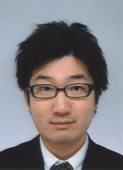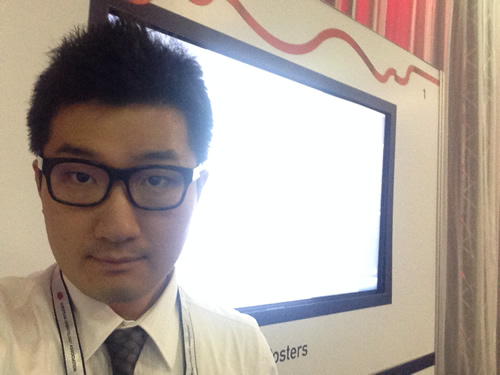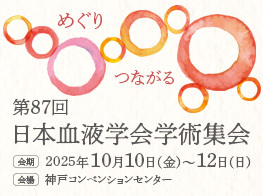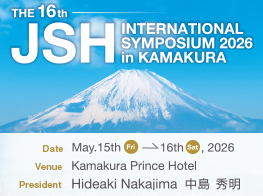
名前:飯島一智 【独立行政法人 国立成育医療研究センター研究所 小児血液・腫瘍研究部 】
発表日時:2014年6月13日
発表形式:e-poster
Title:
Investigation of ph-like all by gene set enrichment analysis and identification of their specific expression genes
Authors:
Kazutoshi Iijima*1,2, Nobutaka Kiyokawa1, Kazuhiko Nakabayashi1, Hitoshi Ichikawa3, Tomoo Osumi1, Hiroki Yoshihara4, Kentaro Ohki5, Motohiro Kato6, Takashi Fukushima7, Hiroyuki Shimada8, Tetsuya Mori1, Akitoshi Kinoshita9, Kenji Matsumoto1, Katsuyoshi Koh10, Akira Kikuchi11, Yasuhide Hayashi5, Atsushi Manabe4, Akira Ohara12
Affiliations:
1National Center for Child Health and Development, 2Department of Industrial Chemistry, Tokyo University of Science, 3Division of Genetics, National Cancer Center Research Institute, 4Depertment of Pediatrics, St. Luke's International Hospital, Tokyo, 5Gunma Children’s Medical Center, Gunma, 6Depertment of Pediatrics, University of Tokyo, Tokyo, 7Depertment of Pediatrics, University of Tsukuba, Tsukuba, 8Department of Pediatrics, Keio University, Tokyo, 9Depertment of Pediatrics, St. Marianna University, Kawasaki, 10Depertment of Hematolgy & Oncology, Saitama Children’s Medical Center, Saitama, 11Depertment of Pediatrics, Teikyo University, 12Depertment of Pediatrics, Toho University Omori Medical Center, Tokyo, Japan
Abstract:
Background
Recently, “Ph-like” or “BCR-ABL1-like” acute lymphoblastic leukemia (ALL) has been proposed as a subset of B-cell precursor (BCP-) ALL with unfavorable outcome. Although Ph-like ALL lacks BCR-ABL1 as well as other well-known fusion transcripts, they exhibit a gene expression profile of BCR-ABL1-positive ALL-like signature. Since some of Ph-like ALL possess tyrosine kinase (TK)-related fusion transcript and have sensitivity for tyrosine kinase inhibitor, it is important to distinguish Ph-like ALL from other fusion gene-negative BCP-ALLs. The diagnosis of Ph-like ALL is essentially performed by clustering analysis based on gene expression data of a group of patients using Affymetrix GeneChip®, diagnostic method applicable to individual patient using other microarray system is strongly desired. Therefore, we have developed methods to diagnose Ph-like ALL using Gene Set Enrichment Analysis (GSEA). As we presented previously, GSEA and clustering analysis identified distinct subsets of BCP-ALL with approximately 40% overlapping, whereas GSEA can also detect a group with poor prognosis including tyrosine kinase-related fusion transcript-positive cases (ASH 2013).
Aims
In this study, we intended to Ph-like ALL by GSEA based on gene expression data using different microarray system. Furthermore, we also investigated Ph-like ALL specific expression genes to develop alternative diagnostic method for Ph-like ALL. Methods: Gene expression of 152 BCP-ALL cases enrolled on Tokyo Children Cancer Study Group (TCCSG) trials, including TCCSG L07-1602 and L09-1603, were analyzed by microarray Agilent Whole Human Genome DNA Microarray 4x44K v2, respectively. Based on these expression data, Ph-like ALL were investigated using GSEA, a computational method that ascertains whether a given gene set is significantly enriched in a list of genes ranked by their correlation with a phenotype of interest. The specific expression genes of Ph-like ALL, as well as Ph1 ALL, were investigated by fold-change analysis using GeneSpring GX software (Agilent).
Results
10 cases (6.6%) of Ph-like ALL were identified in 152 cases of BCP-ALL by GSEA. They included the cases with Ph-likerelated fusion transcripts, such as P2RY8-CRLF2, IGH@-CRLF2, SNX2-ABL1, EBF1-PDGFRB, as well as ATF7IP-PDGFRB, a novel fusion transcript involving PDGFRB. Some of them revealed early relapses. Next, genes specifically expressed in Ph-like and Ph1 ALL were explored. In similar to Ph1-ALL, high expression of GPR110, MUC4, SEMA6A, GREM1, IL2RA and BAALC, and low expression of RICS, SOX11, RGS1, RGS13, BCL2L11, NR4A1, NR4A3 and BTG3 were observed in Ph-like ALL. Interestingly, high expression of CRLF2 and LDB3, and low expression of ABCC4 and CCNA1 were observed only in Ph-like ALL cases.
Summary/Conclusion
We presented that GSEA can identify Ph-like ALL cases expressing uncommon TK-related fusion transcripts with poor prognosis. Since GSEA is applicable to identification of Ph-like ALL from individual patient based on the gene expression data using other microarray system than GeneChip®, it should be more practical for clinical use. We also identified specific genes expressed in Ph-like ALL cases and the development of method to distinguish Ph-like ALL from other BCP-ALL based on expression of these genes is now underway.
Keywords
Acute lymphoblastic leukemia, Gene expression profile, Pediatric, Ph+ ALL
EHA2014参加レポート
この度日本血液学会 19th EHA Congress Travel Awardを賜り、2014年6月12日-15日にイタリア共和国ミラノで開催されたThe 19th EHA congressに参加し、発表する機会をいただきました。本学術会議はMilano Congressi (MiCo)というヨーロッパ最大の会議場で開催され、1日目は企業によるサテライトシンポジウムとサイエンティフィックワーキンググループ、2日目は教育講演とポスターセッション、3日目、4日目はプレナリーセッションと各国血液学会とのジョイントシンポジウム、口演、ポスターセッションが行われました。教育講演では午前と午後で同一内容が組まれ、重複したものも聴講できるような配慮がなされていました。1日目の午後に1時間にわたり会場全体が停電し、講演が中断するトラブルがあったものの、各日朝の8時から夜の7、8時まで多岐にわたるプログラムが組まれ、活発な議論が行われました。
今回私は東京小児がん研究グループ(TCCSG)に登録されたB前駆細胞型急性リンパ芽球性白血病(BCP-ALL)症例におけるPh-like ALLの判定とその特性についてe-poster発表をさせていただきました。Ph-like ALLとは、BCR-ABL1(Ph)陰性ながらBCR-ABL1陽性症例と類似の遺伝子発現パターンを示し、きわめて予後不良である症例であり、その一部はチロシンキナーゼ阻害剤に対して反応性を有することから、治療戦略上、注目を集めています。通常、Ph-like ALLは多数の症例の遺伝子発現データを用いたクラスタリング解析により判定されますが、私達のグループではGene Set Enrichment Analysis (GSEA)という手法により個別の症例ごとにPh-like ALLであるかどうかを判定する方法を確立しました。今回はその手法を用いて判定したPh-like ALL症例について、特徴的な遺伝子発現とRNAseqにより見つけた新規キメラ遺伝子について報告しました。Ph-like ALLは小児分野において見出されたものですが、最近ではAYA世代や成人のALL症例においてもPh-like症例が高頻度に存在することが明らかとなり、本会議でもAcute Lymphoblastic Leukemia Biologyの口演にPh-like ALL関連の演題が2題採択されるなどその注目の高さを感じました。
私が発表したe-posterについてもご紹介したいと思います。e-posterとはその名前の通り大型モニターを使用した電子ポスターのことであり、EHAでは今回から取り入れたそうです。e-poster発表者は事前にポスターの電子ファイルを提出しておき、指定されたセッションにおいて座長の進行のもと大型のタッチスクリーンに表示された電子ポスターを使用してプレゼンテーション、質疑応答を行います。タッチスクリーンのため項目ごとズームして表示することができ、口演発表のスライドのような感覚で発表することができます。また、画面は鮮やかで位置も高いため、従来のポスター発表のように人だかりができてよく見られない、ということもありませんでした。e-poster発表者にも通常のポスタースペースが与えられるため、時間外にはそこに掲示した紙のポスターを使用して討論をすることができました。
3日目には日本血液学会役員の先生方やEHA Travel Awardを受賞された他の先生方、推薦者の先生方との昼食会をセッティングしていただきました。会場で大勢の日本人研究者とすれ違うASHとは違い、日本からのEHA参加者は少なく心細さを感じていましたが、この昼食会では多くの先生方と交流することができ、大いに刺激を受けました。本学会で発表した内容をもとに早期に論文としてまとめ、さらに発展させていくよう、一層精進したいと思います。
最後に、このような素晴らしい機会をくださいました、日本血液学会国際委員会の諸先生方、事務局の皆様、平素よりご指導頂き、推薦していただきました独立行政法人 国立成育医療研究センター研究所小児血液・腫瘍研究部清河信敬部長、そして東京小児がん研究グループ(TCCSG)の緒先生方に心より御礼申し上げます。




